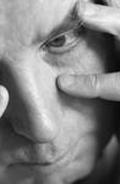Don't fear your sexual disorders
|
|
Sexual dysfunction: in detailEmotional factors affecting sex include both interpersonal problems (such as marital/relationship problems, or lack of trust and open communication between partners) and psychological problems within the individual (depression, sexual fears or guilt, past sexual trauma, and so on). Physical factors include drugs (alcohol, nicotine, narcotics, stimulants, antihypertensives, antihistamines, and some psychotherapeutic drugs); injuries to the back, problems with an enlarged prostate gland, problems with blood supply, nerve damage (as in spinal cord injuries); or disease (diabetic neuropathy, multiple sclerosis, tumors, and, rarely, tertiary syphilis); failure of various organ systems (such as the heart and lungs); endocrine disorders (thyroid, pituitary, or adrenal gland problems); hormonal deficiencies (low testosterone, estrogen, or androgens); and some birth defects. Sexual arousal disorders were previously known as frigidity in women and impotence in men, though these have now been replaced with less judgmental terms. Impotence is now known as erectile dysfunction, and frigidity has been replaced with a number of terms describing specific problems with, for example, desire or arousal. Sexual pain disorders affect women almost exclusively and are known as dyspareunia (painful intercourse) and vaginismus (an involuntary spasm of the muscles of the vaginal wall that interferes with intercourse). Dyspareunia may be caused by insufficient lubrication (vaginal dryness) in women. Sexual dysfunctions are more common in the early adult years, with the majority of people seeking care for such conditions during their late twenties through thirties. The incidence increases again in the geriatric population, typically with gradual onset of symptoms that are associated most commonly with medical causes of sexual dysfunction. What is it impotence?A recent study estimates that 30 million men suffer from various degrees of erectile dysfunction. This can range from mild to severe. It is clearly an age-related phenomenon with the prevalence of erectile dysfunction increasing significantly with age. Surprisingly, by the time men reach 40, 5% of them are completely impotent never achieving an erection rigid enough for penetration. Approximately 15% have significant problems achieving or maintaining an erection. The best way for men to begin solving erectile problems is by reading about men's sexual system - anatomy, physiology, diseases, drugs, diagnosis and treatments. Some problems may be solved simply and others may require a visit to your family doctor or a urologist. In either case, we encourage you to become an educated health care consumer, which should help you regardless of the cause or cure for your problem. The creation of an erection is an extremely complicated cascade of events that requires many different things to happen. There are numerous chemical transmitters involved in this including epinephrine, norepinephrine, acetylcholine, prostaglandins and nitric oxide. The exact mechanism by which erection occurs is still unclear but we do know that the neural input from the brain is extremely important. Reflex erections, as seen in people with cord damage such as paraplegics, are often poor erections and not sustainable for prolonged periods of intercourse. Erections can change over time, sometimes stronger or weaker than other times. When men are in their teens they often have little control over their erections and obtain erections when not in a sexual situation. For most men this stops in their late teens to early twenties. As men get older, erections may not always be obtained when they want one. Almost every man has the occasional time when their erection is less strong than they would like but sometimes it becomes a problem. In order to increase the size of an erection, there must be an increase in blood flow and, at the same time, the blood has to be prevented from leaving the penis. Erectile dysfunction, also called impotence, means that a man's penis doesn't get hard enough to have intercourse. The man cannot get or maintain an erection. This condition affects approximately 30 million men in the United States. Erectile dysfunction is not the same as premature ejaculation, the inability to ejaculate (retarded ejaculation) or infertility.) Psychological issues such as depression, anxiety, guilt or fear can sometimes cause sexual problems. At one time, these factors were thought to be the major cause of erectile dysfunction. Doctors now know that physical factors are present in most men with erectile dysfunction. However, embarrassment or "performance anxiety" can make a physical problem worse. Erectile dysfunction caused only by psychological causes is found most commonly in young men. Abnormal levels of certain hormones, such as testosterone, thyroid hormone and a pituitary hormone known as prolactin, can interfere with erections and sex drive (libido). This is an uncommon cause of erectile dysfunction. Erectile dysfunction can occur suddenly or gradually. Some men slowly lose the firmness of their erections or how long the erections last. In other men, especially those whose impotence is largely caused by psychological factors, the problem may occur unpredictably and can improve at any time. Despite their difficulties with erections, men with impotence often continue to have normal orgasm and ejaculation. How long your erectile dysfunction lasts depends upon what causes it and how quickly your treatment starts to work. The important thing to remember is that erectile dysfunction is treatable in all age groups. Men who do not benefit from medical or psychological treatment often have success with mechanical or prosthetic devices. External products, known as vacuum erection devices, are safe and highly effective, but many men and their partners find them unappealing. Another option is a surgically placed penile implant. However, because implants require surgery (with the risk of surgical complications), only 10 percent of men with erectile dysfunction choose this option. Vascular (blood vessel) surgery sometimes is recommended for young, healthy men who develop impotence after trauma to the groin.
Definitions and terms on this pageImpotence Antihypertensives Let's go learn world around us!
|

